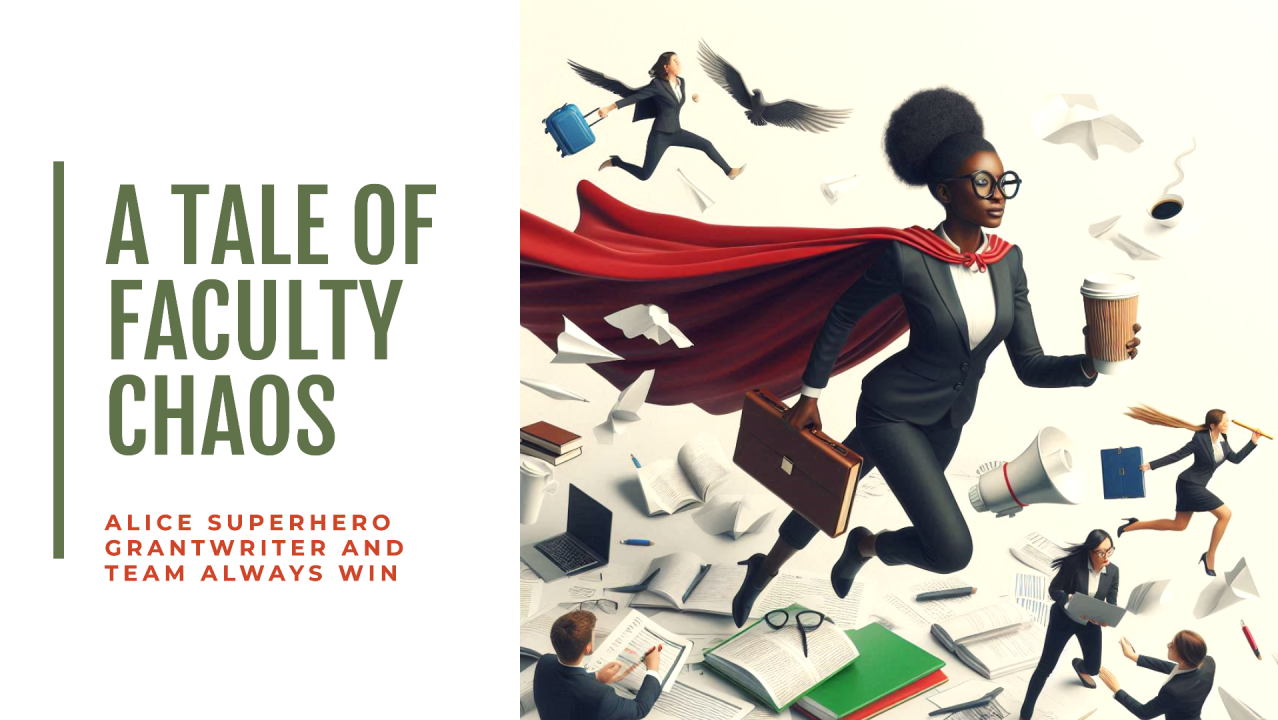In the bustling hallways of Quirksville University, there was a faculty known for their peculiar behavior: the Department of Peculiar Sciences. This department had a unique talent for turning even the simplest tasks into perplexing adventures, much to the amusement and frustration of those who had to work with them.
One sunny Monday morning, the university decided to submit an application for a substantial federal grant focused on promoting groundbreaking research in Peculiar Sciences. The RFP specified the need for a thorough research strategy, a specific budget, and collaboration with other departments. The university, confident in its prospects, entrusted the task to Team Always Win, a dedicated group of grant writers celebrated for their proficiency, perseverance, and remarkable capacity to bring structure to disorder.
Alice, Team Always Win’s team leader, promptly arranged the first meeting with the Department of Peculiar Sciences. She entered the office with an optimistic expression, only to find Dr. Paul Dennis, the department professor selected to be the PI by the Dean of the department, eating lunch and talking on the phone, completely ignoring the session and advice from Alice and her team.
“Greetings! We’re here to discuss the grant request. We need a comprehensive and thorough study plan,” Alice said, trying to get Paul’s attention.
Paul waved his hand dismissively while continuing his phone conversation. “Details, insignificant details. What you need is a clear and forward-thinking perspective! And a touch of creativity.” He then handed Alice a wrinkled napkin adorned with sketches resembling extraterrestrial squids and a partially consumed sandwich. “This is our concept!”
Alice feigned a smile. “We need something that is more concrete and precise.” He disregarded her and continued conversing on the phone. After a short while, Alice and her group exited the conference room without even catching Paul’s eye.
With a tight 30-day deadline, Alice arranged daily meetings with Paul to ensure progress stayed on track. However, each day brought fresh obstacles. It was clear from the outset that Paul had no intention of complying with the structured approach required by Team Always Win. He frequently refused to respond to emails, failed to attend meetings, and ignored Alice’s repeated attempts to get the necessary documents.
On the fifth day, Paul decided to bring in a panel of “experts” who had no federal grant experience whatsoever. These experts, ranging from a local artist to a yoga instructor, confidently advised Alice and her team on how to structure their proposal. “You need more zen in your budget plan,” the yoga instructor suggested, while the artist recommended adding “a splash of color and abstract concepts” to the methodology section.
Alice sighed internally but maintained her politeness. “We need a concise and well-documented proposal—a document that provides a detailed description of your methodologies, anticipated results, and budget,” she reiterated.
Each day became a sequence of peculiar interactions. On the tenth day, the team received a budget proposal hastily written on the back of a takeout menu during a supposed budget planning session.
Despite Paul’s attempts to obstruct the process, Alice persevered. On the fifteenth day, Paul presented a “groundbreaking” data analysis technique that involved interpreting tea leaf patterns. On the twentieth day, Alice discovered they were examining a document written in invisible ink.
Unfazed, Alice endeavored to guide Paul. She organized Zoom meetings, distributed templates, sent email instructions, and held numerous in person meetings, hoping to extract a coherent plan from the chaos. However, Paul outright refused to follow the necessary guidelines.
On the twenty-fifth day, when it seemed they were making headway, Paul replaced the crucial data charts with vibrant illustrations of unicorns, asserting, “Unicorns symbolize our quest for knowledge!”
On the twenty-eighth day, Alice walked into the meeting room to find Paul deeply focused on knitting a three-dimensional representation of their study hypothesis. “It is the conceptual framework we’ve developed,” he remarked with a confident smile.
Finally, Alice and Team Always Win managed to piece together a partially comprehensible plan, despite Paul’s deliberate attempts to undermine every component of the project. They submitted it on the deadline, hoping for a miracle.
The decision came back: rejected.
Paul was not pleased. “How could you let us down like this?” he lamented. “We worked so hard!” He went further, bad-mouthing Alice to other faculty members, calling her incompetent and blaming her for the failure, despite having no proof to back his claims.
Alice, barely able to believe her ears, replied, “We followed the RFP, but we needed more substantial offerings than mere drawings of space squids and shoeboxes.”
Fortunately, other faculty members defended Alice, recognizing her efforts and the impossible task she was handed. “Alice and her team did everything they could,” said Professor Thompson. “It’s clear that the Department of Peculiar Sciences didn’t follow the necessary guidelines.”
The Dean of the Department of Peculiar Sciences openly expressed her disappointment in the lack of funds the department was raising. Given that Alice and her team had helped four other departments at Quirksville University win grants, the Dean was even more upset with Dr. Paul Dennis and told him so in no uncertain terms.
Undeterred by the setback, Paul sought out other grant writing teams. Over the next year, he worked with ten different teams, each experiencing the same chaos. The pattern repeated: nonsensical submissions, rejections, and, of course, blaming the grant writers.
Alice and her team watched from the sidelines, now somewhat amused by Paul’s antics. They formed a support group with the other beleaguered teams, sharing stories of their surreal encounters with Paul and his department.
Ultimately, Quirksville University professor Dr. Dennis never won a federal grant. But the legend of the whimsical napkin proposal endured, serving as a cautionary tale of what not to do when writing a grant submission. Alice and Team Always Win, however, earned a peculiar badge of honor—they survived Paul and his department and lived to tell the tale, with plenty of laughter along the way.
Not long ago, at a university gathering, Alice captivated her new colleagues with tales of her adventures. Inevitably, someone would ask, “Did they ever win a grant?”
Alice would chuckle and reply, “No, but they sure taught us the value of clarity, detail, and the undeniable power of a well-placed doodle.”
Being a grant writer is incredibly rewarding, especially when you successfully secure funding for a client’s innovative ideas. There’s a profound satisfaction in knowing that your efforts can help bring about meaningful change and advancements. Crafting a compelling proposal, navigating the complexities of funding requirements, and ultimately receiving that coveted grant approval is a thrill like no other.
However, having a client who refuses to listen and then blames you for not finding the funding can be extremely frustrating. It’s those challenging clients who test your patience and resilience. But even in those moments, there are valuable lessons to be learned about persistence and adaptability.
Despite these hurdles, I take pride in my successes. In 2023 alone, I helped secured approximately $1 million in awards for clients. These victories are a testament to the hard work and dedication that goes into each proposal. And while the difficult clients often make for the most memorable stories, they also reinforce why I love what I do—because even amidst the chaos and challenges, the impact of our work is undeniable.
If you’re ready to meet a dynamic team, send me a DM. I will make sure Alice the Super Grant Shero is ready to be at your service, turning your innovative ideas into funded realities.

